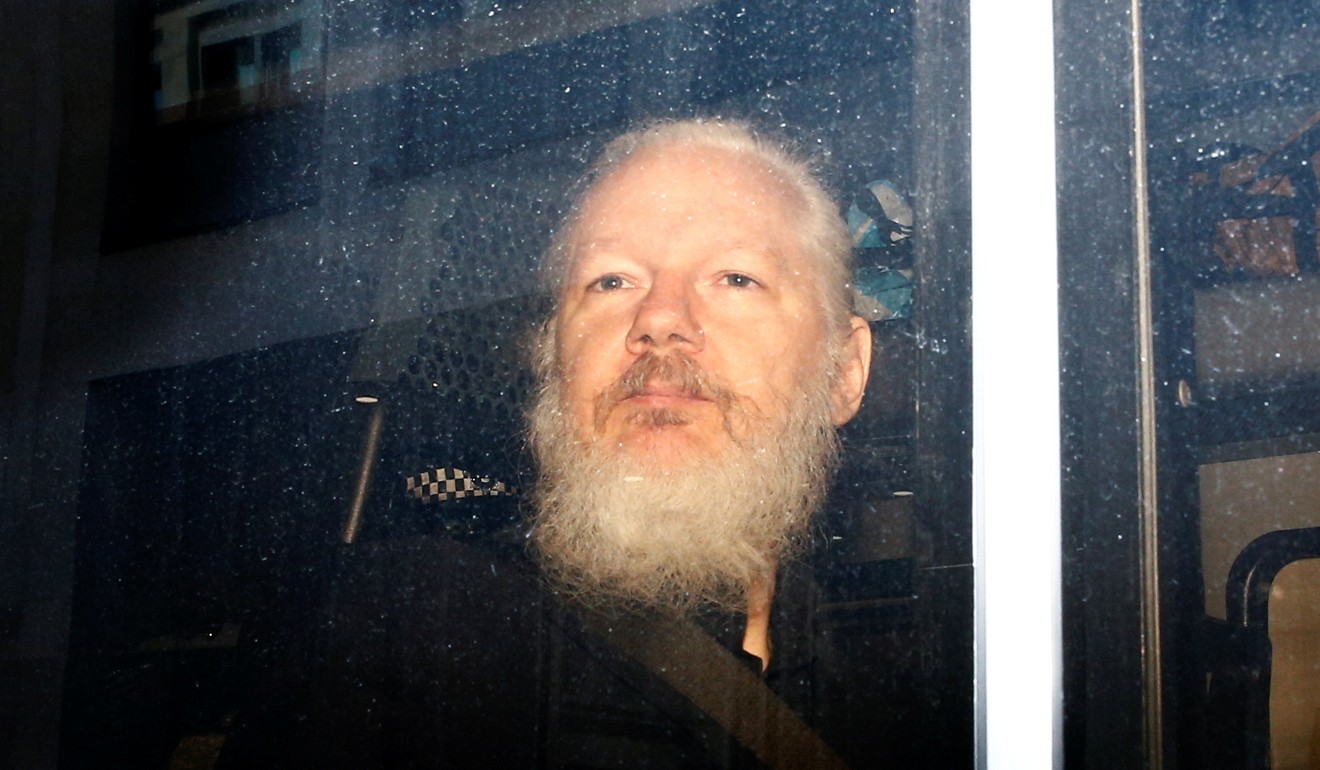
WikiLeaks founder Julian Assange arrested in London under US extradition warrant
- Justice Department said arrest was in line with extradition treaty and Assange faces five years in prison if convicted of computer hacking conspiracy
- UK court said Assange faces up to a year in prison for skipping bail
WikiLeaks founder Julian Assange was arrested and dragged out of Ecuador’s embassy in London by British police on Thursday, ending a seven-year stay after the South American country withdrew his asylum to pave the way for his extradition to the United States.
Video footage of the dramatic arrest was watched around the world as the 47-year-old fugitive, looking much older in a long white beard and clutching a book about the military industrial complex, yelled at supporters to “resist” as he was bundled out of the building into a police van.
The arrest was under a 2012 warrant for failure to surrender to court, but police later said Assange was also arrested under a US extradition warrant.
At Westminster Magistrates Court, hours after his arrest, Assange pleaded not guilty to skipping bail, insisting he had a “reasonable excuse”. He was found guilty and could be sentenced to 12 months in prison at a hearing on May 2.
The judge said Assange’s extradition hearing will be on June 12.
The US Justice Department said Britain was abiding by its extradition treaty and Assange faces five years in prison in the US if convicted of computer hacking conspiracy.

The hacker turned activist was granted refuge in the embassy in 2012 while on bail in the UK over sexual assault allegations against him in Sweden.
At the time, he claimed that if he was extradited to Sweden he might be arrested by the Americans and face charges related to WikiLeaks publishing hundreds of thousands of US military reports about the wars in Afghanistan and Iraq and American diplomatic communications.
Assange’s Justice Department indictment comes from a criminal investigation dating back to the administration of former president Barack Obama.
Washington on Thursday accused Assange of helping former US soldier Chelsea Manning break into classified computers to access material that was leaked.
Specifically, the indictment accuses Assange of cracking a password on Department of Defence computers connected to a US government network used for classified documents and communications.

Ecuador’s President Lenin Moreno said his government withdrew Assange’s asylum status, citing international convention violations.
“Ecuador has decided with sovereign rights to withdraw the diplomatic asylum to Julian Assange for repeatedly violating international conventions and the protocol of cohabitation,” Moreno said.
He insisted Assange would not be extradited to a country that has the death penalty.
Foreign Secretary Jeremy Hunt thanked Ecuador for breaking the long impasse, insisting on Twitter Assange “is no hero” and “no one is above the law”.
But US whistle-blower Edward Snowden said Assange’s arrest was a “dark moment for press freedom”.
“Images of Ecuador’s ambassador inviting the UK’s secret police into the embassy to drag a publisher of – like it or not – award-winning journalism out of the building are going to end up in the history books,” the whistle-blower said on Twitter.
WikiLeaks characterised Assange’s expulsion as retribution for its reporting on corruption claims against Moreno.
“If President Moreno wants to illegally terminate a refugee publisher’s asylum to cover up an offshore corruption scandal, history will not be kind,” WikiLeaks said.

The lawyer for the Swedish woman who accused Assange of rape in 2010 said on Thursday she and her client would ask Swedish prosecutors to reopen the investigation which was dropped in 2017.
A spokesman for the Swedish Prosecution Authority said: “We are looking into the issue.”
Australia said it was “confident” Assange will get legal due process in the UK.
“Consular officers will seek to visit Mr Assange at his place of detention,” said Foreign Minister Marise Payne.
Russia accused Britain of “strangling freedom” by arresting Assange.
Kremlin spokesman Dmitry Peskov said Moscow hopes that his rights will not be violated.
Journalist and Assange supporter John Pilger called last week for people to “fill the street outside the embassy and protect him and show solidarity with a courageous man”.
Former Baywatch actress Pamela Anderson, reportedly a close friend of Assange, tweeted: “I am in shock. How could you Equador? (Because he exposed you). How could you UK?”
Agence France-Presse, Reuters, Associated Press, The Guardian
